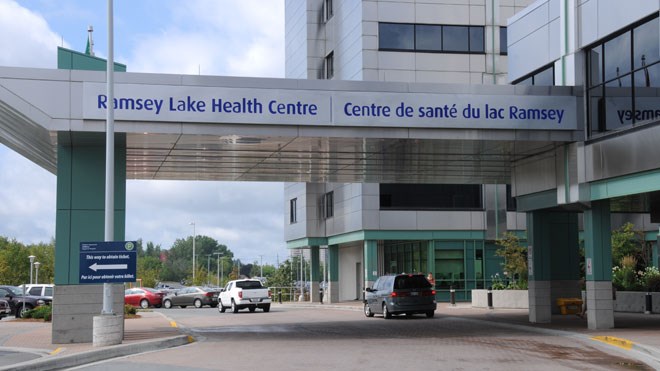Human resources personnel with Health Sciences North will meet soon with its bargaining units to discuss eliminating 51 full-time equivalent positions, affecting 64 employees, as the hospital struggles to contain costs.
Those conversations will follow the presentation of a third-party validation review of HSN’s proposed 2018-2019 budget. It was completed in April, but could not be implemented until the review was done.
The review prompted the North East Local Health Integration Network to allocate additional one-time funding of $4.8 million to HSN to reduce its deficit for the 2018-2019 fiscal year.
Board directors with HSN approved a budget in April with an $4.9-million deficit that would have cut 113 positions among management and non-union staff and unionized employees.
Thirty-seven non-union jobs were to be cut and 76 union jobs eliminated but that number has been reduced because of the extra funding. The hospital has also said about 50 management and non-union jobs have been cut.
The review was conducted by Kevin Empey, former chief executive officer of Lakeridge Health, with support from accounting firm BDO including Michael Barrett, former CEO of the South West LHIN.
The team working on the review, which cost about $100,000, concluded HSN had taken a “rigorous approach” to budgeting and said its proposed savings were based on a sound approach. It found HSN was performing well in the areas of costs per case and targeting improvements where they could be made.
“While being efficient is commendable,” the LHIN said in a release Friday, “the report added … there are few opportunities for financial improvement.”
The validation team made 41 recommendations on 23 themes regarding the hospital’s budget — 25 to HSN, nine to both the North East LHIN and HSN and seven to the North East LHIN.
In a blog post for HSN employees, president and chief executive officer Dominic Giroux said HSN isn’t the only hospital facing budget challenges. Seven hospitals in the Northeast had deficits larger as a proportion of revenues than HSN did.
“It is fair to call this a systemic health care challenge in Northeastern Ontario,” Giroux said in his blog.
He said he was pleased the validation team and the LHIN identified some external challenges HSN is facing that are hurting its operations and financial sustainability.
Giroux said the one-time funding will ease the impact of some efficiencies the hospital was planning to make, something he called a positive outcome of the validation process.
Among the recommendations by the review team was that HSN work more closely with its community partners and the LHIN during the budget process. The hospital now operates some programs and services in the community and not the hospital because HSN had identified a need for them. The new funding will give the hospital more time to engage partners in other models of delivery.
The team identified other savings to eliminate HSN’s $11.1 million deficit relating to overtime, admitting, length of stay and rent charged by HSN. The potential savings from those could be $300,000 this year and $500,000 to $1 million annually thereafter. It did say some expenses will need to be incurred to achieve some of these proposed savings.
In his blog to employees, Giroux said the $4.8 million in extra funds will save specific clinical services that would have had to be cut.
Giroux told employees the hospital was eliminating its 2017-2018 $11.1-million deficit, containing its deficit below 1% of the budget as mandated by its board of directors, returning to a balanced position as early as 2019-2020 and expecting to remain balanced in 2020-2021.
These difficult measures should provide stability to HSN for the next three years, he said
“When we have returned HSN to a balanced budget, our attention will turn to planning what's ahead for the years to come,” Giroux told employees.
In a news release, the North East LHIN said it ordered the review to safeguard the continuity of care for patients in Sudbury and throughout the North East.
Kate Fyfe, vice-president of performance and accountability for the North East LHIN, was among the team that presented the review report to HSN directors Thursday evening. The board was supportive of the report’s recommendations, said Fyfe, and very engaged in the process.
The review was ordered by the LHIN to ensure any cuts to services or programs were not affecting the region’s aging demographic and that the quality of those would not be affected either, she said.
The LHIN is also committing to making Health ministry officials aware of the unique challenges faced in the North East related to geography and capacity.
Fyfe said $3 million of the $4.8 million one-time funding will come from the $822 million in extra hospital funding announced earlier this year by then Premier Kathleen Wynne.
The other $1.8 million will come from the LHIN’s home and community care fund.
Dave Shelefontiuk is president of CUPE Local 1623, which had 1,200 members as recently as two years ago and now has 1,100. He expects many of the 51 FTE cuts will affect his members who work in clerical and service positions.
He has praised Giroux for his openness with employees, but said he left a meeting with union leaders and the CEO Friday morning disappointed that he could not give members more details about the job losses.
HSN and the LHIN have said they will respect the collective agreements of people whose jobs are eliminated. In most cases, those contracts call for 90 days’ notice before layoffs.
Shelefontiuk also regrets that it’s his members who will bear the brunt of the cuts.
“We’re all a team,” said Shelefontiuk. “We may not be sticking needles” in patients’ arms, but his members are responsible for reducing the risk of infection and other services that directly impact patient care.
